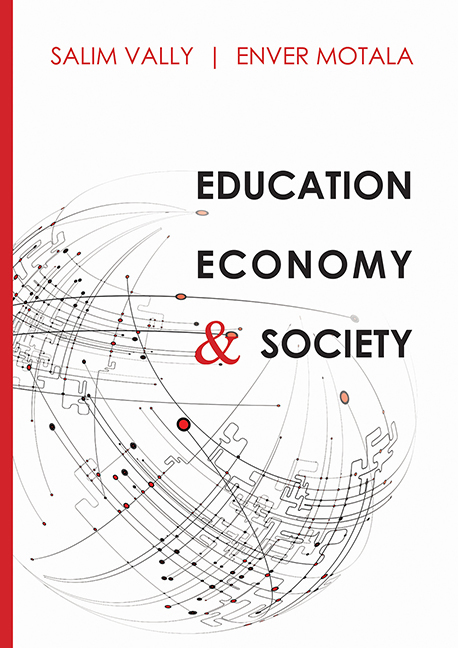Book contents
- Frontmatter
- Contents
- Foreword
- Preface
- About the contributors
- Acknowledgements
- Abbreviations and acronyms
- Chapter 1 ‘NO ONE TO BLAME BUT THEMSELVES’: Rethinking the Relationship between Education, Skills and Employment
- Chapter 2 EDUCATION AND ECONOMY: Demystifying the Skills Discourse
- Chapter 3 UNIVERSITIES AND THE ‘KNOWLEDGE ECONOMY’
- Chapter 4 GOING AROUND IN CIRCLES: Employability, Responsiveness, and the Reform of the College Sector
- Chapter 5 BUILDING A TRANSFORMATIVE PEDAGOGY in Vocational Education
- Chapter 6 SKILLS? WHAT SKILLS? JOBS? WHAT JOBS? An Overview of Research into Education/Labour Market Relationships
- Chapter 7 DEBATING THE NEXUS of Education, Skills and Technology in the Age of Lean Production: A Case Study of the ArcelorMittal Vanderbijlpark Plant
- Chapter 8 SKILLS, JOBS AND DECEPTION: Examples from the South African Workplace
- Chapter 9 ON THE USE AND ABUSE OF EDUCATION: Reflections on Unemployment, the ‘Skills Gap’ and ‘Zombie Economics’
- Chapter 10 THE YOUTH WAGE SUBSIDY in South Africa: Employment, Skills and ‘Churning’
- Chapter 11 EPISTEMIC INJUSTICE and the Struggle for Recognition: Human Dignity and the Recognition of Prior Learning
- Chapter 12 (RE)CLAIMING WORKERS' EDUCATION
- Chapter 13 SKILLS DEVELOPMENT in Post-Apartheid South Africa: Issues, Arguments and Contestations
- Index
Chapter 8 - SKILLS, JOBS AND DECEPTION: Examples from the South African Workplace
Published online by Cambridge University Press: 16 February 2020
- Frontmatter
- Contents
- Foreword
- Preface
- About the contributors
- Acknowledgements
- Abbreviations and acronyms
- Chapter 1 ‘NO ONE TO BLAME BUT THEMSELVES’: Rethinking the Relationship between Education, Skills and Employment
- Chapter 2 EDUCATION AND ECONOMY: Demystifying the Skills Discourse
- Chapter 3 UNIVERSITIES AND THE ‘KNOWLEDGE ECONOMY’
- Chapter 4 GOING AROUND IN CIRCLES: Employability, Responsiveness, and the Reform of the College Sector
- Chapter 5 BUILDING A TRANSFORMATIVE PEDAGOGY in Vocational Education
- Chapter 6 SKILLS? WHAT SKILLS? JOBS? WHAT JOBS? An Overview of Research into Education/Labour Market Relationships
- Chapter 7 DEBATING THE NEXUS of Education, Skills and Technology in the Age of Lean Production: A Case Study of the ArcelorMittal Vanderbijlpark Plant
- Chapter 8 SKILLS, JOBS AND DECEPTION: Examples from the South African Workplace
- Chapter 9 ON THE USE AND ABUSE OF EDUCATION: Reflections on Unemployment, the ‘Skills Gap’ and ‘Zombie Economics’
- Chapter 10 THE YOUTH WAGE SUBSIDY in South Africa: Employment, Skills and ‘Churning’
- Chapter 11 EPISTEMIC INJUSTICE and the Struggle for Recognition: Human Dignity and the Recognition of Prior Learning
- Chapter 12 (RE)CLAIMING WORKERS' EDUCATION
- Chapter 13 SKILLS DEVELOPMENT in Post-Apartheid South Africa: Issues, Arguments and Contestations
- Index
Summary
Introduction
This chapter is largely based on research conducted in a textile factory for the author's master's thesis (Baatjes 2008). The research focused on a possible link between a particular educational level used as a ‘measure’ for the first stage of selecting prospective employees as machine operators, and the actual knowledge and skills used in the workplace to perform the job. The research included conducting interviews in the workplace; observing machine operators performing their jobs; and analysing various documents such as the assessment tool. The study concluded that there was incongruence between the ‘requisite’ knowledge and skills and the actual knowledge and skills needed. The language and mathematics competencies needed in order to be deemed ‘competent’ in the Adult Basic Education and Training (ABET) assessment are at a higher level than the language and mathematics needed ‘on-the-job’. The study was not simply about language and mathematics competencies but also about the ‘new workplace’ that has emerged with the advent and spread of globalisation. The study looked at the appropriateness of the ‘measure’ used as a requirement for an interview for a job, and by so doing it explored issues of inclusion and exclusion, power relations, morality, ethics and social justice.
Besides sharing the findings of the research at the textile factory, this chapter also provides other examples of the use of assessments designed for a particular purpose, but used inappropriately for another, and draws on these examples to explore issues relating to globalisation, the new workplace, technology and the definition of ‘skill’.
The Broadening Definition of ‘Skill’
The dominant discourse on skill and its relationship to work is ever-present and persuasive, and many well-meaning people uncritically embrace it too. Somehow people are led to believe that the problems and crises experienced in the workplace and indeed, beyond, are largely the fault of the education system and its failure to prepare students for the workplace by teaching them these basic skills (see Brown, Green & Lauder 2000 and Olssen, Codd & O’Neill 2004).
A deeper understanding of what the ‘skills’, which many workers, including graduates, supposedly lack, is necessary. There is, both in South Africa and throughout the world, a new definition of skill which is ‘now broader and more conceptually equivocal than it has ever been’ (Payne 2000:354).
- Type
- Chapter
- Information
- Education, Economy & Society , pp. 153 - 170Publisher: University of South AfricaPrint publication year: 2014



